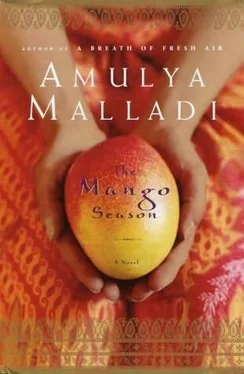At least “they” were Indian, I thought unhappily; my “they” was American and an un-devout Christian to boot.
“Neelima is a very good person,” Sowmya pointed out. “And her family has lived in Hyderabad for generations. She speaks Telugu fluently and cooks our food.”
Food was also very, very essential. But not as essential as the caste.
“But she brought no dowry,” Lata said calmly as she looked over the pile of mangoes my mother and I had bought today at Monda market. “Where will the money for your dowry come from?” she taunted softly, her eyes downcast as she arranged the pleats in her sari, and I saw all fight abandon Sowmya.
“I better get the knives and the chopping boards,” Sowmya said hastily, and disappeared into the kitchen.
Everyone squirmed a little after that. The subjects of dowry and marriage were a soft spot for Sowmya. She had been twenty-seven years old for the past three years and those “three years” made her feel a little less like an old maid. It also made a difference to the suitors Thatha managed to find for her. After all, a girl in her late twenties had a chance at making a better match than one who was thirty.
Objectively speaking, Sowmya would be considered plump; she wore thick glasses and had dark skin-even darker than mine. Her hair was curly and thin and she was not a beauty by anyone’s standards. But what no one saw was that Sowmya’s heart was as big as the pot she used to make payasam in during festivals.
Arranged marriage is not just a crapshoot, as many believe it to be. It is a planned and business-like approach to marriage. A man’s parents want certain qualities in their daughter-in-law, and a woman’s parents want certain qualities in their son-in-law. What the children want usually does not figure in the equation. The parents try to find the perfect match and hope for the best.
Women like Sowmya get caught in no-man’s-land. They have no qualities that anyone is looking for, which means that they have to settle for someone who is in the exact same position, someone who has been rejected by numerous suitors for being less qualified. It’s like finding a job. The job you get is equivalent to your qualifications and what you want does not really matter.
Despite having a bachelor’s in Telugu literature, Sowmya had never held a job in her life. Working, my illustrious and narrow-minded Thatha said, was not for women of our class. And what job could she get anyway? With her education, at best, she could be a secretary or a clerk. Unacceptable to Thatha. Those were careers and jobs for people with a lower socioeconomic status than his.
In the food chain of the Indian academic world, doctors and engineers took the top spots. Ma had been pleased when I got through the entrance exam to get into an engineering school. After all, that ensured a good marriage match for me. It also meant that I could get a job that would not embarrass my parents and would be appropriate for a woman of my social station.
However, Sowmya could not get a job equivalent to her social status because she was not academically qualified, just as she couldn’t get the life partner she fantasized about because she was not physically qualified.
The sad part of it was that Sowmya accepted it as her fate and did nothing to change any part of it and write her own destiny. She probably didn’t fantasize anymore, didn’t even dream about a husband and family anymore. She had sat through many ceremonies during which the prospective groom and his family visited my grandparents’ house to see the prospective bride. Earlier, Sowmya had kept count, but now, almost ten years since the whole drama had begun, she had stopped. My mother, however, hadn’t.
“Sixty-four matches and not one worked out,” she told me during my current visit.
In the beginning, Thatha had refused to budge from his goal of getting a good-looking doctor or engineer for Sowmya. Even when it became evident that the matches he was finding were not going to pan out, he continued. It was when Sowmya turned twenty-five that Thatha started to realize he may have been aiming too high. He started looking at bank managers and the like, but again nothing worked out because he wanted a young man for Sowmya, but men who were twenty-seven years old were looking at girls who were twenty-one, not twenty-five. Now Thatha was looking at lecturers and older men. While Thatha looked for a suitable boy, Sowmya sat through bride-seeing ceremonies and rejections.
“God knows when she will get married,” Ma complained bitterly. “An unmarried daughter, Priya, is like a noose around the neck that is slowly tightening with every passing day.”
I sometimes imagined how it would be to live with my parents and be constantly reminded of how lacking I was. I would slit my wrists in no time and I was amazed that Sowmya hadn’t. She was still the same person I had grown up with; the bitterness that no one would blame her for having seemed to have never touched her.
“Maybe you shouldn’t say things like that,” I said to Lata, wanting to defend my nonconfrontational aunt against the harsh dowry remark. “It isn’t fair to turn this on Sowmya because she likes Anand’s wife.”
Lata quirked an eyebrow. “You are back, what, half an hour, and already you are taking sides?”
My mother held up her hand to silence me before I could respond, her posture clearly saying that she would take care of this one for me, with pleasure. “Lata, my daughter is not taking sides, just trying to be considerate of other people’s feelings.”
The only way to prevent World War III, now that I had spilled pearls of wisdom unwisely, was to change the topic. So I pulled my gift bag close to me-it was time to play Santa Claus.
“I have gifts for everyone,” I said cheerfully, before Lata could tell my mother what she thought about my being considerate of other people’s feelings.
Sowmya blushed when she saw the makeup kit I got for her. She touched the plastic-covered blush and eye shadow and picked up the lipstick and unrolled it to see what color it was. She closed it and put the cap on and shrugged. “What am I going to do with this, Priya?” she asked, I think just to sound reluctant.
“Wear it, ” Lata suggested lightly, but with just enough dabs of sarcasm, and I wondered again. Usually Ammamma protected Sowmya from barbs like that, but the dynamics seemed to have changed. Lata was ruling the roost. First it was the mangoes and now this.
“Ammamma.” I put a blue and white cashmere shawl on her lap and she touched it with curious fingers. She hugged me once again, this time a little lightly, and kissed me on the forehead. “You shouldn’t have. You are here and that is all we care about.”
I agreed with that notion, but I also knew the ritual. Oh yes, there was a ritual: the homecoming ritual. The cardinal law was that “you cannot come home without a substantial amount of gifts, irrespective of your financial predicament.”
The gifts also cannot be bought and dispensed of without drama. Every gift will be analyzed. For example, I cannot give Ammamma a less expensive gift than the one I would give to Neelima. That would offend Ammamma because she was senior to Neelima. Similarly, I cannot buy Lata something more expensive than what I would get for my mother. I also cannot buy something so cheap that Lata would be offended.
With all the opposing and contradicting rules, buying a gift for Lata had been a grueling task.
“Just pick out something womanly,” Nick suggested. “Works for my aunt who hates my mother’s guts. I just buy her perfume every year for Christmas and she’s happy.”
I explained to him that it was not quite that simple. I was buying my mother a bottle of perfume along with other assorted gifts. Ma had specifically asked me to get her some perfume and that was why I couldn’t buy Lata perfume, too. I had to buy her something that I hadn’t given my mother but it also should be something that my mother would not want.
Читать дальше











